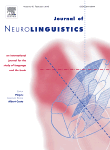Anna Drożdżowicz co-authors "Task strategy may contribute to performance differences between monolinguals and bilinguals in cognitive control tasks: ERP evidence"
Journal of Neurolinguistics 46, May 2018, pp. 78-92

Abstract
A bilingual advantage in the efficiency of executive control in young adults has been demonstrated in many but not all studies. We aimed to test the efficiency of executive control in a lateralized version of the Attentional Network Task and to investigate accompanying ERP components. The performance of young adult bilinguals who acquired their L2 relatively late but were balanced in proficiency and daily usage of L1 and L2 was compared with that of young adults who reported low proficiency and marginal daily usage of L2. Balanced bilinguals were more accurate in the incongruent condition and at the same time as fast as the control group across conditions. Interestingly, in comparison to the control group, the bilingual group demonstrated more enhanced response-locked negativities to both incorrect (ERN) and correct responses (CRN). The obtained pattern of results suggests that the groups may have differed in terms of task strategies. Bilinguals may have controlled their performance more effectively, which resulted in their better conflict resolution, as compared to the control group. In conclusion, we point to the importance of considering qualitative differences in task processing and strategy while studying group differences - an approach rarely considered in current research on executive functions in bilinguals.
